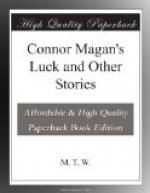“Well, Totchen,” said Tot’s boy-uncle Will, looking up from his book as something pierced his knee, as only Tot’s small elbow could pierce. “Well, Totchen; what is it? Stories? Then jump!”
O, what happy state to sit enthroned upon a big boy-uncle’s knee, and listen, listen, listen, with eyes like the dog’s in the fairy story—“as big as the great round tower at Copenhagen”—more or less!
“What shall I tell you? Aladdin? Puss in Boots? Cin—”
“Soogar Wiver” interrupted Tot, promptly.
“Soogar Wiver? Why, what a little pitcher for ears! What do you know about Soogar Wiver?”
“Oo said,” said Tot, with decision, “that oo went fisin’ in Soogar Wiver.”
“Why, so I did,” said the boy, reflectively.
“Is it vewy sweet?” asked Tot.
“Sweet?” echoed the boy, taking his wicked cue and with a prolonged drawing in of the lips. “I should say so! Why, its bed is solid sugar, with as many grades of sugar grains for sand as one finds in a grocer shop.”
“Do wivers do to bed dus ’ike ’ittle dirls?” demanded Tot, whose young existence was embittered by that seemingly needless ceremony.
“You see,” said the boy, with the air of communicating much useful information, “it is even worse than that. They never get up at all. Only once in a while they get into tantrums and break loose and make every one scatter; for a river is one of the quickest fellows at a run you ever saw. And well they might be, for they are at it all the time, asleep or awake.”
“I sood ’ike to see Soogar Wiver,” said Tot.
“Wouldn’t you!” And Will, fairly launched, tossed all conscientious scruples overboard, and steered boldly out into the deep waters of wildest imagination. “You just would! Why, as I said, the river bed is solid sugar. Think how nice to be able to turn over and take a gnaw at your bed-post when you feel hungry! The pebbles are sugar plums, the bigger stones are broken sugar loaves, and the rocks, why, the rocks are made out of rock candy, of course.”
Tot sighed, blissfully.
“It is the jolliest place to go fishing. You just lie down on a rock, nibble it occasionally, chew up a few pebbles, take a bite at a stone, and if you are thirsty—as, of course, you would be—there is a whole river of eau sucre—that is what the French call sweetened water—running right by, enough to supply all France. And, all the time, you are hauling up the fish just as fast as they can bite. They are a peculiar kind of fish, wouldn’t look at a worm. Nothing short of taffy bait will tempt them. They look like those fishes you buy at the confectioners—penny apiece—very high-colored, very flat, and mostly tail; and, when cooked, they taste very much like them.”
Tot still gazed up into the remorseless boy’s face in unblinking confidence. And, indeed, from one who, for the last two weeks, together with Tot, had been on the most familiar footing with giants, ogres, and hop-o-my-thumbs, and held the most sympathizing relations towards enchanted princesses and conquering knights, an account of a “Soogar Wiver,” was not to be regarded as startling. As for Will’s conscience—well, his mission with Tot was to amuse, not instruct—if Tot was amused the whole end and aim of his efforts was attained.




